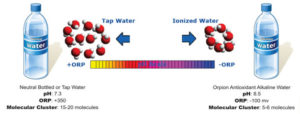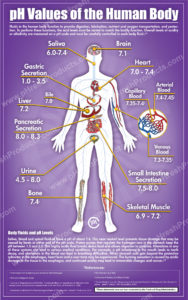 Uncategorized
Uncategorized
What’s the deal with all this alkaline water?
If you’re not already aware, there’s a ton of information floating around about alkaline water. Some is positive, some is negative, and many articles out there try to sell some sort of expensive machine, often repeating some unverified science-y jargon. Not only is the information about the water properties themselves disputable, but it also doesn’t explain clearly how it interacts with the body. So in the spirit of journalism, we’re here to set the record straight, give you just the facts, and throw in some supporting visuals. So you can make up your own mind like a grown up.
What IS Alkaline Water?

In principle, “alkaline water” is simple. Acid and alkaline exist in a pH scale between 0 and 14 with 7 being neutral, and any water over a pH of 7 is considered “alkaline”. Despite this simple truth, there are many intricacies of the pH+ water available across the world that deserve some clarification. Let’s first decipher some of the language found on various water bottles and the machinery which companies use to market their claims.
Natural – implies the water with its unique pH originates from springs and natural water sources.
Ionic – specifies alkaline water created from machines that split it into alkaline ionized water, which contains negative hydroxyl OH- ions, and into acidic ionized water, which contains positive hydrogen H+ ions. (1)
Microclustered – ionized or alkalized water that is electrically re-structured to a smaller cluster size of 3-5 H2O molecules per cluster. (2)
Low Surface Tension – the lower the tension, the higher the absorbability. Alkaline water touts a low surface tension, which is closer to blood.
Oxidation Reduction Potential (ORP) – many companies tout the effectiveness of their alkaline water alone, but less stake a claim to the antioxidant potential of their water. Chemically speaking, oxidation reduction potential or (ORP) is generally known as “a measurement that indicates the degree to which a substance is capable of oxidizing or reducing another substance. ” (3) “Reducing” is the chemical property of adding an electron, oxidizing is taking one away.
The Argument

Unless you’ve been living under a rock, then you’ve heard the claim of what alkaline water can do for the body. According to many health advocates, the human body is slightly alkaline, with a pH between 7.35 and 7.45. Meat products, some tap water, and many processed foods often register somewhere on the acid spectrum, and even cancer has a tendency to show up when pH levels in the body take a dive.
Alkaline water, sometimes referred to as ionized water, is said to have the ability to rebalance the body into said alkaline state. Balance body pH, and everything else falls into place: cancer goes away, the body becomes detoxified, arthritis and joint issues fade away, and you will even begin to levitate while shooting laser beams from your eyes.
The pH Problem
Okay, maybe one of those side effects seems a bit far-fetched, but really, the other health claims with alkaline water may be a stretch, as well. That is, when we’re not looking at pH as a variable in a larger equation.

Looking deeper into our biochemistry, the body’s pH is much different depending on where you look. Stomach pH averages anywhere from 1.5 to 3.5 (4), the small intestine ranges between 5.7 to 7.4 depending on which section you observe (5), blood keeps balanced at about 7.35 (6), and average urine samples test out at roughly 6.0 (7).
What does this mean? Frankly, water’s alkalinity alone doesn’t seem to be so important when considering the bigger picture. For one, there’s a big pH change from the stomach to its next stop in the small intestine. Secondly, the body is influenced by many other factors that alter pH in one direction or another. Some of these other factors include:
- Low mineral consumption
- Alcohol and drug use
- Lack of exercise
- Low dietary fiber
- Excess animal meat consumption (not from grass-fed sources)
- Toxic chemical exposure
Simply put, looking at water’s alkalinity alone is like looking at one small piece of a much larger puzzle. Proper alkalinity in the body is important, but there may be some other factors to look for that may make “alkaline water” play a more important role.
The (Possible) Solution
It’s safe to say the study of water and biochemistry is rather “fluid”. The properties of water are still very mysterious, but we can observe certain aspects of alkaline water that may give all those health claims some credit after all.
Mineral Content: let’s get one thing straight: “pure alkaline water” does not exist in nature, and “pure water” is chemically neutral. It only becomes alkaline by the introduction of alkaline (or ionically charged) minerals such as calcium, silica, potassium, magnesium, and bicarbonate (8). So what makes alkaline water alkalizing? It’s more likely that the addition of these minerals to the body helps to create pH balance as they find their way into each organ system where they’re needed.
Oxidation Reduction Potential (ORP): you’ve heard about antioxidants and their role in removing free radicals from the body. There may be similar potential, particularly with ionized water. Many bodily processes produce excess, unstable oxygen. These renegade molecules have a tendency to steal electrons from normal, healthy biological molecules, effectively oxidizing tissue and potentially causing disease. Reduction, the process of a molecule giving away free electrons, creates neutralizing bonds in this manner to those free oxygen molecules, preventing them from causing damage and stealing any more life from your cells and tissues (9).
Microclusters: this one’s a bit more controversial, as it has not been observed in a clinically verifiable form. But the idea is this:
“NMR (Nuclear Magnetic Resonance) analysis reveals that tap water and well water
consists of clusters of 10 to 13 H2 0 molecules. Electrolysis of water in the Ionized Water
unit reduces these clusters to about half their normal size — 5 to 6 water molecules per
cluster.” (9)
What does this mean? Because it is tied up with less chemical or ionic bonds than typical water molecules, micro-clustered alkaline water has a greater potential to attract and reduce the destructive potential of otherwise potentially damaging free oxygen molecules.
Conclusion
Does all this stuff work? They say the power of placebo can have quite the healing effect, so maybe the technical jargon doesn’t even matter. Although the science of alkaline water is admittedly inconclusive, we prefer to give the benefit of the doubt rather than throw the baby out with the bathwater. Science is always improving, so maybe in the near future we’ll actually have the hard data to back up these claims. But for now, you’ll have to trust your gut on this one.
References:
- Which Alkaline Ionized Water Benefits Should You Consider?http://www.ionizedwaterfaq.com/alkaline-ionized-water-benefits-health/#forward#forward#forward#forward#forward#forward#forward#forward#forward
- Microclustering: The Making of Myth http://www.molecularhydrogenfoundation.org/microclustering-the-making-of-a-myth-part-1-facts-claims-and-history/
- Understanding pH and ORP http://www.aquahealthproducts.com/understanding-ph-and-orp
- Stomach acid test https://medlineplus.gov/ency/article/003883.htm
- Intraluminal pH of the human gastrointestinal tract https://www.ncbi.nlm.nih.gov/pubmed/10421978
- Alkaline Diets http://www.healthline.com/health/urine-ph#results4
- Urine pH Level Test http://www.healthline.com/health/urine-ph#results4
- Alkaline water: Legit health food or high-priced hoax? http://www.precisionnutrition.com/alkaline-water-legit-or-hoax
- Water: The Chemistry of Life http://www.phmiracleliving.com/t-Water-Chemistry.aspx
